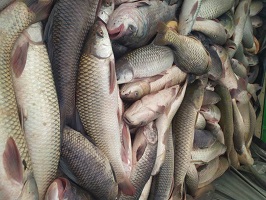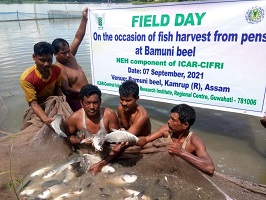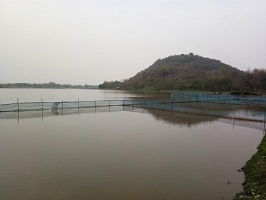भाकृअनुप-केंद्रीय अंतर्देशीय मात्स्यिकी अनुसंधान संस्थान, क्षेत्रीय केंद्र, गुवाहाटी, असम ने पूर्वोत्तर भारत के फ्लडप्लेन वेटलैंड्स (बील) के लिए संस्कृति आधारित मत्स्य पालन (सीबीएफ) और कलम संस्कृति प्रौद्योगिकी के लिए प्रोटोकॉल विकसित किए। उत्तर-पूर्वी पहाड़ी घटक के तहत भाकृअनुप-सीआईएफआरआई द्वारा शुरू की गई आउटरीच गतिविधियों के एक भाग के रूप में, संस्थान ने बामुनी बील (एन 26º 18' 91'' और ई 91º 45'60''), कामरूप ग्रामीण जिला, असम में संस्कृति आधारित मत्स्य पालन (सीबीएफ) और कलम संस्कृति का प्रदर्शन किया।


बामुनी बील, निचली ब्रह्मपुत्र घाटी की एक बंद बाढ़ के मैदान की आर्द्रभूमि, एक छोटी बील है जिसमें 16 हेक्टेयर पानी फैला हुआ क्षेत्र है और आकार में लगभग अंडाकार है। मानसून में बील में पानी की गहराई 2.5 मीटर से 3.7 मीटर होती है जो सर्दियों के दौरान 1.5 मीटर से 2.5 मीटर तक कम हो जाती है जिससे यह पेन कल्चर और सीबीएफ दोनों के लिए उपयुक्त हो जाता है।
बेजेरा विकास खंड के अंतर्गत बामुनीगांव के 65 बोडो आदिवासी परिवारों की आजीविका बील पर निर्भर है। 2006-07 से पहले, बील पूरी तरह से मत्स्य पालन के लिए समर्पित था और निजी पार्टियों को सालाना काफी कम राशि (15,000 रुपये से 20,000/- रुपये प्रति माह) के लिए पट्टे पर दिया गया था।

बील में बहुत कम या कोई पूरक स्टॉकिंग का अभ्यास नहीं किया गया था, जिसके परिणामस्वरूप 2019-20 के दौरान कम मछली उत्पादन (लगभग 6.29 टन) और समुदाय के सदस्यों (17,692 रुपये प्रति परिवार) की मामूली शुद्ध वार्षिक आय हुई।
स्थानीय आदिवासी मछुआरे परिवारों की आय बढ़ाने के लिए सामुदायिक भागीदारी के माध्यम से सीबीएफ और पेन संस्कृति का प्रदर्शन करने के लिए बील का चयन किया गया था।
जागरूकता कार्यक्रम आयोजित करने के बाद भाकृअनुप-सीआईएफआरआई, क्षेत्रीय केंद्र, गुवाहाटी द्वारा 19 अक्टूबर, 2020 को पूरक मछली बीज भंडारण कार्यक्रम और 23 फरवरी, 2021 को सीआईएफआरआई-एचडीपीई पेन का उपयोग करते हुए पेन कल्चर आयोजित किया गया। संस्थान ने 48,000 उन्नत फिश फिंगरलिंग को संग्रहीत किया (स्थानीय समुदाय के परामर्श से सीबीएफ के लिए बील में @3,000 प्रति हेक्टेयर, प्रमुख भारतीय कार्प, माइनर कार्प और विदेशी कार्प को शामिल किया)।
बील में स्थापित सीआईएफआरआई पेन एचडीपीई {3,000 मी एसक्वेयरव ( m2 ) क्षेत्र } को कार्प फिंगरलिंग्स {3 से 9 प्रति मी क्यूब ( m3 ) } के साथ स्टॉक किया गया था और एएन (AN) अतिरिक्त आय के रूप में टेबल फिश के उत्पादन के लिए सीआईएफआरआई-केजग्रो फ्लोटिंग फीड (28% क्रूड प्रोटीन) के साथ खिलाया गया था।
मछलियों को 6 महीने की अवधि के लिए कलमों में पाला गया। 7 सितंबर, 2021 को बड़े आकार की मछलियों को पकड़ा गया और छोटी मछलियों को बील में छोड दिया गया। बील से मछलियों की प्रमुख उत्पादन 12 से 13 जनवरी, 2022 के दौरान की गई थी और माघ बिहू (असमिया समुदाय का त्योहार) के अवसर पर अच्छी कीमत (औसत 230 रुपये प्रति किलोग्राम) प्राप्त की गई थी। अब तक (2021-22) बील से कुल 13.52 टन मछलियों को पकड़ा गया और उनकी बिक्री की गई।
गांव के सभी 65 बोडो आदिवासी मछुआरे परिवारों को सालाना शुद्ध आय प्रति परिवार रु. 44,763 हुए। साथ ही सीबीएफ और पेन कल्चर को सफलतापूर्वक अपनाने से 2019-20 की तुलना में कुल मछली उत्पादन में 117% और स्थानीय आदिवासी मछुआरों की शुद्ध आय में 153% की वृद्धि हुई।
सिफरी पेन एचडीपीई और सिफरी सीएजीईजीआरओडब्ल्यू भारतीय कृषि अनुसंधान परिषद के नाम से पंजीकृत ट्रेडमार्क हैं।
(स्रोत: भाकृअनुप-केंद्रीय अंतर्देशीय मात्स्यिकी अनुसंधान संस्थान, बैरकपुर, कोलकाता)







फेसबुक पर लाइक करें
यूट्यूब पर सदस्यता लें
X पर फॉलो करना X
इंस्टाग्राम पर लाइक करें